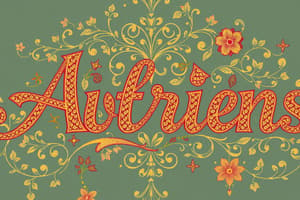Podcast
Questions and Answers
Which of the following correctly represents the past tense formation in Afrikaans?
Which of the following correctly represents the past tense formation in Afrikaans?
- ek loop - I walked
- ek sal loop - I will walk
- ek loop nie - I do not walk
- ek het geloop - I walked (correct)
What is the correct way to negate a verb in Afrikaans?
What is the correct way to negate a verb in Afrikaans?
- Placing 'nik' before the verb.
- Placing 'nie' after the verb. (correct)
- Using 'geen' at the beginning of the sentence.
- Adding 'nicht' at the end of the sentence.
Which of the following words in Afrikaans is a common noun?
Which of the following words in Afrikaans is a common noun?
- loop
- jy
- boom (correct)
- mooi
Which Afrikaans pronoun translates to 'we' in English?
Which Afrikaans pronoun translates to 'we' in English?
Who is known for works dealing with apartheid and existential themes in Afrikaans literature?
Who is known for works dealing with apartheid and existential themes in Afrikaans literature?
What theme is frequently depicted in Afrikaans poetry?
What theme is frequently depicted in Afrikaans poetry?
Which of the following is a greeting in Afrikaans?
Which of the following is a greeting in Afrikaans?
Flashcards are hidden until you start studying
Study Notes
Afrikaans Study Notes
Grammar
- Word Order: Generally follows a Subject-Verb-Object (SVO) structure.
- Tenses:
- Present: Regular forms (e.g., ek loop - I walk).
- Past: Often formed by adding "het" or using the simple past form (e.g., ek het geloop - I walked).
- Future: Formed with "sal" (e.g., ek sal loop - I will walk).
- Nouns:
- Gender: Nouns have no grammatical gender, but they may have prefixes indicating diminutive or plural forms.
- Plurals: Typically formed by adding "s" or "e" (e.g., hond - honde).
- Pronouns:
- Personal pronouns: ek (I), jy (you), hy/ sy (he/she), ons (we), julle (you plural), hulle (they).
- Possessive pronouns: my (my), jou (your), sy (his), haar (her).
- Adjectives:
- Usually precede nouns and do not change form for gender or number (e.g., mooi huis - beautiful house).
- Negation: Formed by placing "nie" after the verb and at the end of the sentence (e.g., Ek loop nie - I do not walk).
Vocabulary
-
Basic Words:
- Greetings: Hallo (Hello), Totsiens (Goodbye), Goeie môre (Good morning)
- Numbers: Een (1), Twee (2), Drie (3), etc.
- Common nouns: Huis (house), Boom (tree), Mens (person)
- Verbs: Loop (to walk), Eet (to eat), Sien (to see)
-
Common Phrases:
- Hoe gaan dit? (How are you?)
- Wat is jou naam? (What is your name?)
- Ek hou van... (I like...)
-
Themes: Words often grouped by themes such as family (gesin), nature (natuur), feelings (gevoelens), etc.
Literature
-
Notable Authors:
- André P. Brink: Known for works that deal with apartheid and existential themes.
- Marlene van Niekerk: Explores complex social and cultural themes in her literature.
- C. Louis Leipoldt: Known for poetry and contributions to Afrikaans literature.
-
Genres:
- Poetry: Rich tradition with themes ranging from nature to love and politics.
- Prose: Includes novels and short stories that reflect South African life and identity.
- Drama: Afrikaans plays often tackle societal issues, identity, and culture.
-
Key Themes:
- Identity: Exploration of Afrikaner identity and the effects of apartheid.
- Nature: Frequently depicted in poetry and prose.
- Social Issues: Critical perspective on politics and society, particularly during and after apartheid.
-
Awards:
- Hertzog Prize: Acknowledges literary excellence in Afrikaans literature.
- Janie Oosthuysen Prize: For significant contributions to Afrikaans literature.
Afrikaans Grammar
- Word Order follows the Subject-Verb-Object (SVO) pattern.
- Tenses include:
- Present: formed regularly (e.g., ek loop - I walk).
- Past: formed with "het" or the simple past (e.g., ek het geloop - I walked).
- Future: formed with "sal" (e.g., ek sal loop - I will walk).
- Nouns have no grammatical gender.
- Plurals are formed by adding "s" or "e" (e.g., hond - honde).
- Pronouns:
- Personal Pronouns: ek (I), jy (you), hy/ sy (he/she), ons (we), julle (you plural), hulle (they).
- Possessive Pronouns: my (my), jou (your), sy (his), haar (her).
- Adjectives typically precede nouns and don't change for gender or number (e.g., mooi huis - beautiful house).
- Negation is formed by placing "nie" after the verb and at the end of the sentence (e.g., Ek loop nie - I do not walk).
Afrikaans Vocabulary
- Basic Words include:
- Greetings: Hallo (Hello), Totsiens (Goodbye), Goeie môre (Good morning).
- Numbers: Een (1), Twee (2), Drie (3), etc.
- Common Nouns: Huis (house), Boom (tree), Mens (person).
- Verbs: Loop (to walk), Eet (to eat), Sien (to see).
- Common Phrases:
- Hoe gaan dit? (How are you?)
- Wat is jou naam? (What is your name?)
- Ek hou van... (I like...)
- Themes: Words are often grouped by themes like family (gesin), nature (natuur), feelings (gevoelens), etc.
Afrikaans Literature
- Notable Authors:
- André P. Brink: Known for works dealing with apartheid and existential themes.
- Marlene van Niekerk: Explores complex social and cultural themes in her literature.
- C. Louis Leipoldt: Known for poetry and contributions to Afrikaans literature.
- Genres:
- Poetry: Rich tradition with themes ranging from nature to love and politics.
- Prose: Includes novels and short stories that reflect South African life and identity.
- Drama: Afrikaans plays often tackle societal issues, identity, and culture.
- Key Themes:
- Identity: Exploration of Afrikaner identity and the effects of apartheid.
- Nature: Frequently depicted in poetry and prose.
- Social Issues: Critical perspective on politics and society, particularly during and after apartheid.
- Awards:
- Hertzog Prize: Recognizes literary excellence in Afrikaans literature.
- Janie Oosthuysen Prize: Given for significant contributions to Afrikaans literature.
Studying That Suits You
Use AI to generate personalized quizzes and flashcards to suit your learning preferences.




